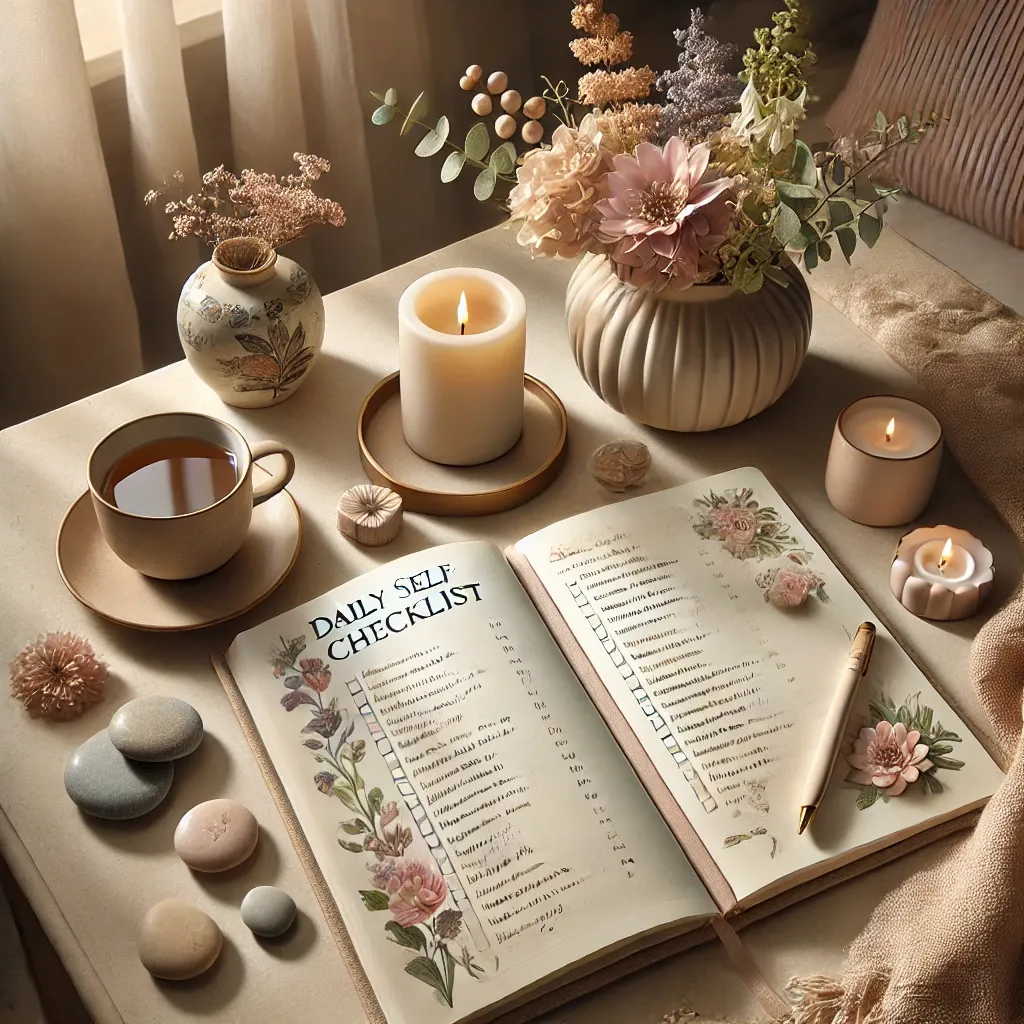📋 Table of Contents
Self-care is more than just skincare—it’s a comprehensive lifestyle of caring for your body and mind. In today’s fast-paced world, it’s easy to lose sight of ourselves. That’s why it’s so important to take a little time each day to look after yourself.
‘Self-care’ covers a wide range of areas—health, emotions, mental well-being, rest, and eating habits. Simply creating a routine for yourself to start or end the day can dramatically improve your quality of life. Let me now introduce a daily self-care checklist just for you! 😊
✅ From here on, the sections begin! Take a look at each one below! 📝
🧖♀️ The Concept and Importance of Self-Care
Self-care literally means ‘taking care of oneself.’ It’s easy to neglect yourself in a busy and exhausting daily life, but doing so can quickly lead to burnout. That’s why self-care is not a choice but a necessity.
Especially in modern society where mental stress builds up easily, emotional regulation and psychological stability are more important than ever. Self-care is the most basic starting point for this. Just 10 minutes a day to talk with yourself can make a big difference.
To me, self-care is an expression of self-respect. Learning how to care for yourself before seeking external validation naturally leads to a healthier life path. Your emotions become more flexible, too.
There are many ways to practice self-care. Drinking more than 1.5L of water a day, getting enough sleep, or simply doing daily stretches. It may seem trivial, but repeated actions have powerful effects.
🌸 Categorized Examples of Self-Care
| Category | Example Activities | Duration | Effects |
|---|---|---|---|
| Mental | Meditation, journaling | 10–15 mins | Calmness, stress relief |
| Physical | Walking, stretching | 15–30 mins | Better circulation, refreshment |
| Environmental | Cleaning, lighting scented candles | 5–20 mins | Improved focus, healing |
As you can see, self-care doesn’t have to be grand. With just a little intention to care for yourself, each day can feel more peaceful and enjoyable. 😊
🌟 The Amazing Benefits of Self-Care
One of the first noticeable changes from consistent self-care is emotional stability. You become more composed with situations that used to easily irritate you, and mood swings lessen. Habits like meditation and journaling help strengthen emotional resilience.
Physical health also improves noticeably. Sleep quality enhances, and chronic fatigue or headaches often decrease. Regular exercise and stretching relieve muscle tension and increase energy. When your body feels better, your mind naturally follows.
Developing the habit of self-care also boosts your sense of self-efficacy. As you maintain routines just for yourself, you build confidence in your ability to take care of yourself. This not only enhances self-esteem but also helps you show up more healthily in relationships with others.
Moreover, self-care is a long-term habit that improves your overall quality of life. It can help prevent depression or reduce anxiety. Because mental and physical health are interconnected, improving one often positively affects the other.
💡 Indicators of Change from Self-Care
| Area of Effect | Indicator of Change | Timeframe |
|---|---|---|
| Emotional Stability | Reduced anxiety, calmer responses | 2 weeks – 1 month |
| Physical Vitality | Less fatigue, better sleep | 1–2 weeks |
| Self-Efficacy | Increased confidence, higher self-esteem | Over 1 month |
The changes may come slowly, but they are certainly real. As you continue to practice self-care, you’ll gradually feel yourself becoming a happier person without even realizing it. 🎈
🌿 Daily Self-Care Checklist
Small habits are incredibly important for making each day more vibrant and healthy. This self-care checklist includes activities you can easily do by investing just 10 to 30 minutes a day. It’s best to incorporate them into your daily life naturally, without pressure. 🌈
The checklist is divided into morning, afternoon, and evening sections. Simply creating routines that suit each time of day helps your body and mind stay balanced and at ease.
What matters is not trying to do everything perfectly, but staying consistent. Even if you miss a day, don’t beat yourself up—just start again tomorrow. Self-care is about giving yourself warm, gentle moments 😊
Here’s the actual checklist! It’ll help to write it in your notebook or set reminders on your phone!
✅ Daily Self-Care Checklist
| Time of Day | Activities | Purpose | Recommended Duration |
|---|---|---|---|
| Morning | Drink water, light stretching, write down to-dos | Energize your day | 10–15 mins |
| Afternoon | Walk, drink water regularly, rest your eyes | Maintain focus, reduce stress | 15–20 mins |
| Evening | Warm shower, gratitude journaling, sleep routine | Relax and prepare for sleep | 20–30 mins |
Don’t feel like you have to follow every single item from the start—choose what you need first. You can always add more items that work for you and make the checklist uniquely yours 💚
🧠 Mental Health Care Routine
Mental health directly affects all the emotions and ways of thinking we experience in daily life. Just because you’re not depressed doesn’t mean your mind is healthy. Understanding yourself and practicing emotional management is the true core of mental health care.
Try spending a few minutes each day meditating or doing deep breathing in a quiet space. Inhale and exhale slowly while focusing on “this very moment.” It may feel awkward at first, but over time, you’ll feel your mind become calmer.
Another great way to organize emotions is through “emotional journaling.” Just writing down the feelings you had during the day helps you make sense of your thoughts and recognize what you react to most sensitively. Facing negative emotions honestly rather than suppressing them brings great healing.
Lastly, practice cultivating gratitude in your everyday life. Simply recalling three things you’re thankful for today can begin to shift your mindset in a positive direction. ☀️
🧘♀️ Components of Mental Health Routine
| Activity | Description | Duration |
|---|---|---|
| Meditation | Clear your mind, focus on breathing | 5–10 mins |
| Emotional Journaling | Record and reflect on your emotions | 10–15 mins |
| Gratitude Diary | Find joy in small things | 5 mins |
These mental health routines are simple enough for anyone to practice and can gradually improve your quality of life. It’s not about forcing yourself to think positively, but about learning to acknowledge your emotions and accept yourself 💖
💪 Physical Health Care Routine
Physical health is just as important as mental health! Since our bodies are closely connected to our minds, feeling physically tired or heavy can drag down your mood. That’s why having a daily movement routine can significantly boost your energy 💥
The most basic foundation is getting enough sleep. Adults typically need 7–8 hours of sleep a night. It’s not just about total hours—it’s much more important to sleep and wake up at regular times. Quality sleep is the basis for energy recovery.
And it doesn’t have to be intense workouts—walking, stretching, and yoga are all great ways to stay active. Even taking the stairs or walking instead of using public transport increases your activity levels. Just 20–30 minutes of light movement can brighten your mood!
Hydration is also a key part of physical well-being. Drinking a glass of water right after waking up and staying hydrated throughout the day helps with focus, digestion, and even skin health. Try swapping coffee for lukewarm water now and then!
🏃♀️ Physical Self-Care Routine Summary
| Activity | How to Practice | Recommended Time/Frequency |
|---|---|---|
| Sleep | Avoid screens 30 minutes before bed | 7–8 hours |
| Walking | Walk 30 minutes a day, take stairs | At least once daily |
| Hydration | Drink water after waking up & between meals | 6–8 cups |
As you follow these routines, you’ll feel lighter and less fatigued. It’s also rewarding to gradually build up healthy habits just for yourself 😄
⚖ Tips for a Balanced Day
Even good habits can become stressful if overdone. That’s why what really matters is “balance.” Whether it’s self-care, work, or relationships, maintaining a moderate and harmonious flow is the ideal 💡
First, time management is crucial. Try dividing your 24-hour day into portions for essential tasks, enjoyable activities, and rest. For example, using the 8:8:8 rule—8 hours for work, 8 hours for leisure, and 8 hours for sleep—can be a helpful guide. Of course, this should be flexible 😊
Also, practice letting go of “perfectionism.” Even if you don’t follow every plan today, remind yourself it’s okay. Sometimes, doing absolutely nothing can be the most healing experience!
And remember, “rest” is also a productive time. Doing nothing isn’t laziness—it actually helps refresh your brain, improve concentration, and spark creativity 🧘
🌀 Example Daily Routine for Balance
| Time of Day | Recommended Activity | Balance Point |
|---|---|---|
| Morning | Focused work, high-productivity tasks | Peak concentration time |
| Afternoon | Walking, light stretching | Mind-body recharge |
| Evening | Gratitude journaling, meditation, calming activities | Emotional relaxation & closure |
A balanced day begins with not pushing yourself too hard. As you create a routine that respects and nurtures yourself, you’ll gain confidence in managing your day on your own terms 🌿
📚 FAQ
Q1. Do I have to practice self-care every day?
A1. Daily practice is great, but what’s more important is to continue without pressure. Practicing self-care just 3–4 times a week can still have positive effects.
Q2. Does self-care have to be done alone?
A2. While self-care is primarily for yourself, you can still walk with a friend or do yoga together—sharing self-care with others is totally fine!
Q3. What should I do if I don’t have time for self-care?
A3. Start small—5 minutes of meditation, 3 minutes of stretching, or even closing your eyes for a minute. What matters is not missing the chance to reconnect with yourself ⏱
Q4. Does self-care really reduce stress?
A4. Yes! Scientifically, self-care activities are known to lower cortisol (the stress hormone) levels. It truly helps calm the mind.
Q5. How do I start emotional journaling?
A5. Begin by jotting down the most memorable feelings or moments of your day. There are no rules—just write honestly and freely.
Q6. Any tips for maintaining self-care consistently?
A6. Choose only the activities that suit you and check off each day on a calendar. Keeping a record really helps build the habit 📆
Q7. At what age is self-care most important?
A7. Self-care is essential for all ages, but especially during high-stress periods like young adulthood and middle age. Starting the habit early benefits your entire life.
Q8. Isn’t self-care a luxury?
A8. Not at all! Self-care is a basic part of living a healthy life. Taking care of yourself is an act of self-love and a necessary part of well-being 💕

